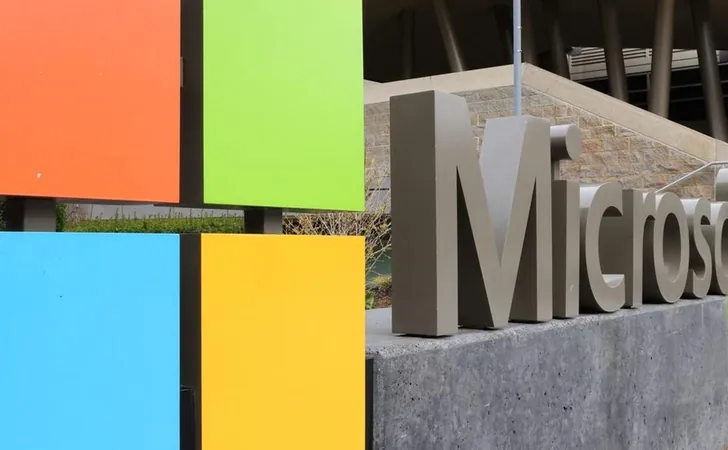
Microsoft Issues Urgent Warning to 1 Billion Windows Users: Say Goodbye to Passwords!
2025-03-30
Author: Ken Lee
Microsoft's Announcement
In a groundbreaking update, Microsoft has officially announced that it is moving away from passwords altogether— a move that affects over 1 billion users globally. The tech giant has recognized the vulnerabilities associated with traditional passwords, stating they can be easily guessed or forgotten, making accounts increasingly susceptible to attacks.
As Microsoft declared back in December, "The password era is ending." Cyber attacks on user passwords have surged, with approximately 7,000 password-related attacks blocked every second, almost double from the previous year. In light of these statistics, Microsoft is on a mission to encourage users to adopt passkeys as their new form of authentication.
What are Passkeys?
A passkey serves as a secure replacement for passwords and two-factor authentication (2FA) codes by connecting authentication to hardware devices. This means that instead of relying on something that can be stolen or intercepted, passkeys use biometric data like fingerprints or facial recognition to boost security. Given this advanced method of identification, passkeys are inherently more resistant to phishing attempts, a method increasingly favored by cybercriminals.
Microsoft emphasizes that passkeys are designed to be simple and user-friendly. They eliminate the stress of remembering complex passwords while also adding an additional layer of security since each passkey is unique to the specific service, preventing unauthorized access across different platforms.
Transitioning to a Passwordless Future
As part of its latest shift, Microsoft is set to roll out an updated sign-in process for users of its web and mobile applications by the end of April. New account creation will require only an email address; users will receive a one-time code to verify their accounts, eliminating the need for a Microsoft password right from the start.
Once logged in, users will then create their unique passkeys. Microsoft has updated its sign-in logic to ensure that passkeys will be the default option wherever possible since they provide a faster and more secure user experience—reportedly three times quicker than the traditional password method.
Concerned about the lingering risks that passwords pose, Microsoft aims to eradicate them entirely. Even if users adopt passkeys, having a password as a backup could still leave accounts vulnerable to phishing. This realization strengthens their resolve to phase out passwords completely as AI-driven attacks and successful 2FA compromises become more common.
Industry Insights and Future Trends
The FIDO Alliance, which has long advocated for password-less authentication, applauded Microsoft's decision. CEO Andrew Shikiar noted that this development marks a significant milestone in the global shift away from passwords. Analysts affirm that phishing-resistant authentication is projected to dominate within the next two years.
Despite Microsoft's forward momentum, other platforms like Google are still treating passwords as backup options, which could potentially leave vulnerabilities intact. Observers are urging other companies to follow Microsoft's lead and work towards the complete abandonment of passwords for better security.
In an encouraging trend, data from FIDO shows a sharp increase in passkey familiarity—growing from 39% in 2022 to a projected 57% in 2024. This indicates that users are more likely to embrace passkeys as they become accustomed to their advantages.
As Microsoft meticulously refines the passkey experience, early results indicate that it is not only faster but also more successful than traditional methods—98% vs. 32% success rates for signing in. The drive for widespread adoption of passkeys is seen as a pivotal step in creating a phishing-resistant environment for all digital interactions.
Conclusion
While the transition to passkeys is still in progress, it is clear that Microsoft is leading the charge toward a future free from passwords. With more users deleting their passwords and embracing passkeys, the potential for a safer online experience is becoming a reality. However, as this pivotal shift unfolds, users and companies alike must remain vigilant to ensure that digital security keeps pace with rapidly evolving cyber threats.




 Brasil (PT)
Brasil (PT)
 Canada (EN)
Canada (EN)
 Chile (ES)
Chile (ES)
 Česko (CS)
Česko (CS)
 대한민국 (KO)
대한민국 (KO)
 España (ES)
España (ES)
 France (FR)
France (FR)
 Hong Kong (EN)
Hong Kong (EN)
 Italia (IT)
Italia (IT)
 日本 (JA)
日本 (JA)
 Magyarország (HU)
Magyarország (HU)
 Norge (NO)
Norge (NO)
 Polska (PL)
Polska (PL)
 Schweiz (DE)
Schweiz (DE)
 Singapore (EN)
Singapore (EN)
 Sverige (SV)
Sverige (SV)
 Suomi (FI)
Suomi (FI)
 Türkiye (TR)
Türkiye (TR)
 الإمارات العربية المتحدة (AR)
الإمارات العربية المتحدة (AR)